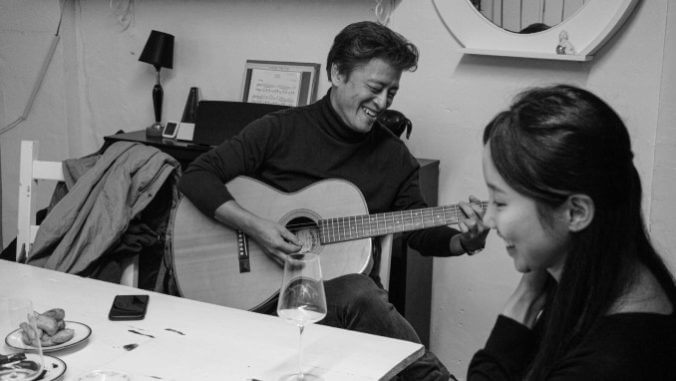Characters and Their Shifting Living Quarters Are Realized and Reset in Walk Up

The social influences of one’s surroundings—namely the various dwellings we inhabit—act as a clever framing mechanism in South Korean director Hong Sang-soo’s Walk Up. Specifically, the film visits each floor-spanning apartment of one particular building, characters neatly shuffling between each residence as they navigate personal employment woes and fluctuating relationship tensions. As Hong makes his way through the building from the ground up, the interpersonal connections between characters shift—romances blossom and fizzle, familial ties strengthen and disintegrate, rental power dynamics sweeten before souring—until they ultimately reset, ready to unfold anew.
Filmmaker Byung-soo (Kwon Hae-hyo) and his daughter Jeong-su (Park Mi-so) arrive at a building owned by Ms. Kim (Lee Hye-young), an old friend of the director. Ms. Kim gives the two a tour of the three story edifice, which houses her own work studio on the basement level, her own residence on the first floor, an intimate restaurant owned by a woman named Sunhee (Song Seon-mi) and an apartment rented by a reclusive artist on the top level. After briefly entering each unit (and probably violating a couple lease agreements in the process), the three retire to Ms. Kim’s apartment for an evening of copious wine drinking. Suddenly, Byung-soo gets a call and states that he must run off to a production-related meeting. He urges his daughter and Ms. Kim to stay and drink, promising that he’ll be back shortly. Hours pass without his return, and Jeong-su drunkenly presses Ms. Kim to hire her as an interior design apprentice.
As the young woman departs to fetch more wine from a convenience store, the next segment begins with Byung-soo, Ms. Kim and Sunhee eating a meal at the latter’s restaurant, wherein we find the film’s thesis of art, financing and the general impossibility of the two—creativity and capital—coexisting. “For them, a film is purely a means of making money,” Byung-soo drunkenly laments when he reveals that the plug was pulled on his most recent film just weeks before it was set to enter production. “Money is the only standard to judge anything.”
As the building’s landlord, Ms. Kim proves just how vital making money is to the artistic process. Earlier in the film, when Byung-soo tours the uppermost apartment in the building and expresses admiration for the rooftop terrace, Ms. Kim urges him to move in. “The person living here keeps missing his rent…he’s a painter, but he doesn’t really earn money.” In an act of (albeit opportunistic) kindness, she tells Byung-soo he can move in rent-free. In the film’s third segment, it’s revealed he took her up on the offer—but his lack of profit in the film industry has caused their relationship to strain significantly. After showing up at his door with a piece of mail she “opened by accident” thinking it was hers, she confronts him about this creative drought. “Are you not making movies these days?” She asks him in a condescending drawl. “Not right now. I need to rest. Maybe in two years?” He offers.
-

-

-

-

-

-

-

-

-

-

-

-

-

-

-

-

-

-

-

-

-

-

-

-

-

-

-

-

-

-

-

-

-

-

-

-

-

-

-

-








































